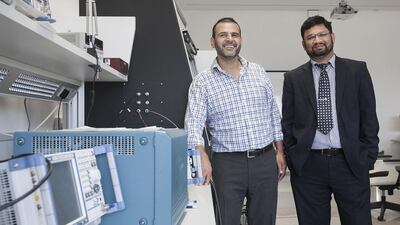ABU DHABI // Scientists at Khalifa University are developing a heart monitor to help people with health conditions improve their fitness safely and keep professional athletes in peak condition, particularly during summer.
Dr Hani Saleh, an electrical engineer, and biomedical engineer Dr Ahsan Khandoker are devising a wristband that can be worn by athletes to help stop them overexerting in training and alert them to health problems.
The wristband will be fitted with five sensors including an electrocardiogram heart monitor, oxygenisation monitor and thermometer. It can measure outside air temperature and humidity levels.
“There are currently no ways to monitor exercise intensity outside the laboratory and the existing wristbands being used can’t determine intensity or a person’s safe zones,” said Dr Khandoker.
“What we’re devising can do the same thing without the oxygen mask used in the laboratory setting. The current wristbands just display a heart rate and some show a pulse rate but none can say what your limits are. That safe zone is different from person to person.”
The device won the duo Dh500,000 in funding at Challenge 22 in Qatar, a research competition funded by Qatar’s supreme council as part of the build-up the 2022 World Cup.
Over the years several high profile sportsmen have suffered cardiac arrest while competing, including footballers Christian Benitez who died in 2013 in game for El Jaish in Qatar aged 27, and Tim Nicot, 23, a leftback for fourth-division Belgian side Wilrijk-Beerschot who died in May this year.
The American College of Sports Medicine says cardiac arrest is the second biggest killer of professional athletes after accidents.
The scientists’ device is especially useful for obese people with conditions such as diabetes who are trying to start, or return to, an exercise regime and need to find a safe level to workout. More than half of diabetes sufferers have heart problems.
“Many people come back to exercise or start it from a sedentary lifestyle and early on get an injury then don’t carry on at all,” said Dr Saleh.
“This helps them push safely, especially those at higher risk of problems.”
Once finished and available to buy, the device should cost about Dh550, not much more than the current range of less advanced monitors that sell for around Dh400.
Two models will be available, one for recreational use and one aimed at athletes.
Once technical issues with a prototype are ironed out, the team hopes that its wristband will be made by one of the current manufacturers of smart watches.
Sports scientist Dr Khaled Dougman, who is based in Abu Dhabi, said the monitor will be a vital tool for athletes, not least those training and competing in extreme temperatures, to monitor physiological responses. “We really need to monitor the safe zones for exercising,” he said.
“This device is really needed to see how the body adapts when it gets to its maximum.
“This could save lives. There are lots people pushing themselves to the maximum and we need to monitor this.”
Candice Ford, who has represented the UAE in regional Crossfit competitions, said the monitor would be a welcome addition to her gym bag.
“I know many athletes who use heart rate variability devices to track their recovery and coaches who use the data to monitor and control the volume and intensity of their training. They find it extremely valuable.”
Marcus Smith, who has just completed the gruelling 250km desert race, Marathon Des Sables, agreed. “There is no doubt advances in technology enables humans to perform at higher levels,” he said.
mswan@thenational.ae

